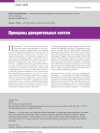Principles of Trust Systems
DOI: https://doi.org/10.33917/es-6.186.2022.126-133
Principles are the basis of the law: a constant connection between the previous and the next, between the current state of the world and the immediate coming. One of the basic principles of the evolution of human society since ancient times has been the principle of trust — you could only survive together by trusting your own. The principle of trust was the basis for building trust-based management systems that evolved, reflecting the basic models of the market code.
References:
1. Puankare A. O nauke [About Science]. Per. s fr. pod red. L.S. Pontryagina. Moscow, Nauka, 1990, 736 p.
2. Saraev V.N. Kollektivnyi iskusstvennyi intellekt. Platforma [Collective Artificial Intelligence. Platform]. Moscow, 2019, 55 p.
3. Tyumenev A.I. Gosudarstvennoe khozyaistvo drevnego Shumera [State Economy of Ancient Sumer]. Moscow — Leningrad, Izd-vo Akad. nauk SSSR, In-t istorii Akad. nauk SSSR, 1956, 518 p.
4. Litavrin G.G. Kak zhili vizantiitsy [How the Byzantines Lived]. Saint Petersburg, Aleteiya, 2014, 256 p.
5. Devyatov A.P. Prakticheskoe kitaevedenie: Kitai i Rossiya v rakurse peremen: dlya tekh, kto prinimaet resheniya [Practical Chinese Studies: China and Russia in the Perspective of Change: for Those Who Make Decisions]. Moscow, Zhigul’skii, 2008, 176 p.
6. Mil’kov V.V. Osmyslenie istorii v Drevnei Rusi [Comprehension of History in Ancient Russia]. Saint Petersburg, Aleteiya, 2000, 384 p.
7. Skrynnikov R.G. Ivan Groznyi [Ivan the Terrible]. Moscow, Nauka, 1983, 247 p.
8. Dicey A.V. The Privy Council. L., N.Y., Macmilla, 1887, 164 p.
9. Maitland F.W. The Constitutional History of England: A Course of Lectures. Cambr., 1911, 582 p.
10. Fursov K.A. Derzhava-kupets: otnosheniya angliiskoi Ost-Indskoi kompanii s angliiskim gosudarstvom i indiiskimi patrimoniyami [The Merchant Power: Relations of the English East India Company with the English State and Indian Patrimonies]. Moscow, Tovarishchestvo nauchnykh izdanii KMK, 2006, 364 p.
11. Vaino A.E., Kobyakov A.A., Saraev V.N. Kod rynka [Market Code]. Ekonomicheskie strategii, 2011, vol. 13, no 11, pp. 94–99.
12. Glaz’ev S.Yu. Strategiya operezhayushchego razvitiya Rossii v usloviyakh global’nogo krizisa [Strategy of Advanced Development of Russia in the Conditions of the Global Crisis]. Moscow, Ekonomika, 2010, 255 p.
13. Lefevr V.N. Konfliktuyushchie struktury [Conflicting Structures]. Moscow, Sovetskoe radio, 1973, 108 p.
14. Ereshko F.I. Modelirovanie refleksivnykh strategii v upravlyaemykh sistemakh [Modeling of Reflexive Strategies in Controlled Systems]. Moscow, VTs RAN, 2001, 47 p.
15. Soros Dzh. Alkhimiya finansov [The Alchemy of Finance]. Moscow, Infra-M, 1996, 416 p.
16. Neklessa A.I. Transfinitnaya ekonomika [Transfinite Economics]. Ekonomicheskie strategii, 2010, vol. 12, no 3, pp. 18–24.
17. Kantor G. Trudy po teorii mnozhestv [Works on Set Theory]. Moscow, Nauka, 1985, 430 p.



